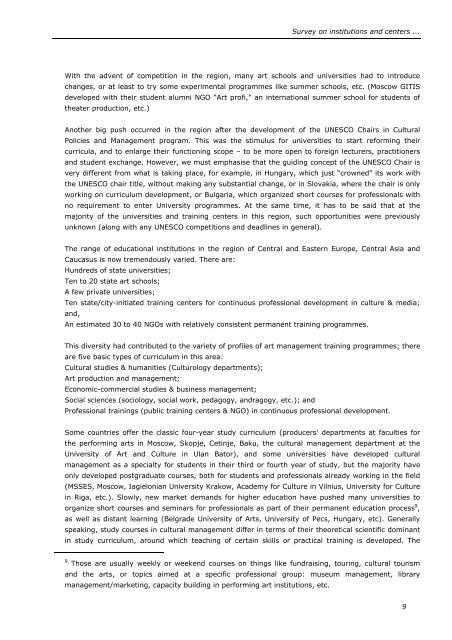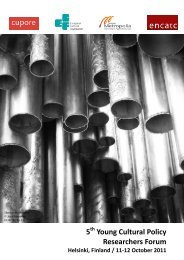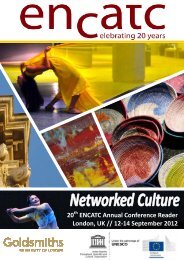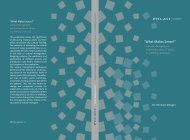Training in cultural policy and management: international ... - Encatc
Training in cultural policy and management: international ... - Encatc
Training in cultural policy and management: international ... - Encatc
Create successful ePaper yourself
Turn your PDF publications into a flip-book with our unique Google optimized e-Paper software.
Survey on <strong>in</strong>stitutions <strong>and</strong> centers ...<br />
With the advent of competition <strong>in</strong> the region, many art schools <strong>and</strong> universities had to <strong>in</strong>troduce<br />
changes, or at least to try some experimental programmes like summer schools, etc. (Moscow GITIS<br />
developed with their student alumni NGO “Art profi,” an <strong>in</strong>ternational summer school for students of<br />
theater production, etc.)<br />
Another big push occurred <strong>in</strong> the region after the development of the UNESCO Chairs <strong>in</strong> Cultural<br />
Policies <strong>and</strong> Management program. This was the stimulus for universities to start reform<strong>in</strong>g their<br />
curricula, <strong>and</strong> to enlarge their function<strong>in</strong>g scope – to be more open to foreign lecturers, practitioners<br />
<strong>and</strong> student exchange. However, we must emphasise that the guid<strong>in</strong>g concept of the UNESCO Chair is<br />
very different from what is tak<strong>in</strong>g place, for example, <strong>in</strong> Hungary, which just “crowned” its work with<br />
the UNESCO chair title, without mak<strong>in</strong>g any substantial change, or <strong>in</strong> Slovakia, where the chair is only<br />
work<strong>in</strong>g on curriculum development, or Bulgaria, which organized short courses for professionals with<br />
no requirement to enter University programmes. At the same time, it has to be said that at the<br />
majority of the universities <strong>and</strong> tra<strong>in</strong><strong>in</strong>g centers <strong>in</strong> this region, such opportunities were previously<br />
unknown (along with any UNESCO competitions <strong>and</strong> deadl<strong>in</strong>es <strong>in</strong> general).<br />
The range of educational <strong>in</strong>stitutions <strong>in</strong> the region of Central <strong>and</strong> Eastern Europe, Central Asia <strong>and</strong><br />
Caucasus is now tremendously varied. There are:<br />
Hundreds of state universities;<br />
Ten to 20 state art schools;<br />
A few private universities;<br />
Ten state/city-<strong>in</strong>itiated tra<strong>in</strong><strong>in</strong>g centers for cont<strong>in</strong>uous professional development <strong>in</strong> culture & media;<br />
<strong>and</strong>,<br />
An estimated 30 to 40 NGOs with relatively consistent permanent tra<strong>in</strong><strong>in</strong>g programmes.<br />
This diversity had contributed to the variety of profiles of art <strong>management</strong> tra<strong>in</strong><strong>in</strong>g programmes; there<br />
are five basic types of curriculum <strong>in</strong> this area:<br />
Cultural studies & humanities (Culturology departments);<br />
Art production <strong>and</strong> <strong>management</strong>;<br />
Economic-commercial studies & bus<strong>in</strong>ess <strong>management</strong>;<br />
Social sciences (sociology, social work, pedagogy, <strong>and</strong>ragogy, etc.); <strong>and</strong><br />
Professional tra<strong>in</strong><strong>in</strong>gs (public tra<strong>in</strong><strong>in</strong>g centers & NGO) <strong>in</strong> cont<strong>in</strong>uous professional development.<br />
Some countries offer the classic four-year study curriculum (producers' departments at faculties for<br />
the perform<strong>in</strong>g arts <strong>in</strong> Moscow, Skopje, Cet<strong>in</strong>je, Baku, the <strong>cultural</strong> <strong>management</strong> department at the<br />
University of Art <strong>and</strong> Culture <strong>in</strong> Ulan Bator), <strong>and</strong> some universities have developed <strong>cultural</strong><br />
<strong>management</strong> as a specialty for students <strong>in</strong> their third or fourth year of study, but the majority have<br />
only developed postgraduate courses, both for students <strong>and</strong> professionals already work<strong>in</strong>g <strong>in</strong> the field<br />
(MSSES, Moscow, Iagielonian University Krakow, Academy for Culture <strong>in</strong> Vilnius, University for Culture<br />
<strong>in</strong> Riga, etc.). Slowly, new market dem<strong>and</strong>s for higher education have pushed many universities to<br />
organize short courses <strong>and</strong> sem<strong>in</strong>ars for professionals as part of their permanent education process 9 ,<br />
as well as distant learn<strong>in</strong>g (Belgrade University of Arts, University of Pecs, Hungary, etc). Generally<br />
speak<strong>in</strong>g, study courses <strong>in</strong> <strong>cultural</strong> <strong>management</strong> differ <strong>in</strong> terms of their theoretical scientific dom<strong>in</strong>ant<br />
<strong>in</strong> study curriculum, around which teach<strong>in</strong>g of certa<strong>in</strong> skills or practical tra<strong>in</strong><strong>in</strong>g is developed. The<br />
9<br />
Those are usually weekly or weekend courses on th<strong>in</strong>gs like fundrais<strong>in</strong>g, tour<strong>in</strong>g, <strong>cultural</strong> tourism<br />
<strong>and</strong> the arts, or topics aimed at a specific professional group: museum <strong>management</strong>, library<br />
<strong>management</strong>/market<strong>in</strong>g, capacity build<strong>in</strong>g <strong>in</strong> perform<strong>in</strong>g art <strong>in</strong>stitutions, etc.<br />
9






